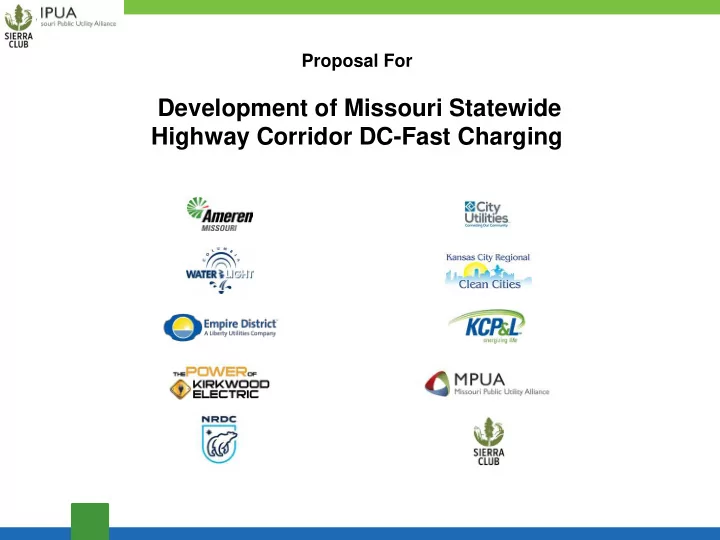

Proposal For Development of Missouri Statewide Highway Corridor DC-Fast Charging
Best.Drive.EVer • Environmental – Highly efficient – ~50% less NOx - even with fossil based utilities – Getting Greener all the time – as utilities add renewables – Zero emissions at ground level • Economics – Less maintenance – simpler, less moving parts – Refueling cost ½ of petroleum – Reduced petroleum dependence – Off-peak charging and grid benefits • Driver Experience – Responsive, quiet, and powerful … Best.Drive. EV er 1 1
Long Distance Barrier • Battery Technology and EVs are developing rapidly • “Breakthrough” EV will have 300 mile range for < $30,000 • A primary remaining barrier will be long-distance charging • DC fast charging is needed for quick refueling on corridors 2 2
Proposed Charging Islands • Statewide • Minimum of 2 DCFC • 50kW or 150kW output • Both CHAdeMO and CCS Combo connectors • Minimum 2 Level 2 ports having ~7kW AC output • Credit card + • Spacing ~25-75 miles apart • In communities of population >2,000 • Near interstates or multilane highways • Acquire "no cost easement" • Within walking distance of amenities • High reliability/availability 3
Charging Island Locations Along Interstates Priority 1 Along multi-lane highways having >10,000 daily trips Priority 2 Along multi-lane highways having <10,000 daily trips Priority 3 Populations >2,000 Spacing 25-75 miles 4
Proposed DCFC Islands Priority 1 Interstates 24 Priority 2 Multi-lane "heavy“ 10 Priority 3 Multi-lane "light" 6 40 50kW $170,000 to $240,000 (150 miles range/hour) 150kW $270,000 to $360,000 (450 miles range/hour) Total development cost of network: $6.8M – $14.4M Factors • Charging rate of equipment • Line extension size and complexity • Location of site • Site development complexity 5
6
Next Steps Is the draft plan well-received? If so….. Formalize expectations and establish APCP-approved oversight plan; Identify specific locations and designate lead utilities for each site; Determine funding distribution and cost-sharing; Collaborate on sourcing materials, services, etc.; Develop final plan with timeline for approval. Detailed design 6-9 months Construction 12-18 months 7
8
Recommend
More recommend